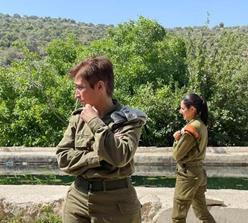The First Female Combat Medic who Made History
Colonel Dr. Anat Sabag, the Chief Combat Medic of the Central Command, says farewell to the IDF after a long and meaningful service. Sabag enlisted in the IDF over 20 years ago as a combat medic in the Engineering Corps. She never thought it would turn into a military career and could not have dreamt of what she would achieve.
"I didn’t plan on serving in the army for so long,” Sabag said. “I thought that after being an officer I would be discharged.” However, she decided to stay and continue to help in the military medicine field. Now at the end of her military career, Sabag can without a doubt say that she is happy that she stayed.
Col. Dr. Anat Sabag is a pioneer for women in the IDF, as she became the first female to serve as a Chief Combat Medic in an operational-regional command. Sabag said, “In order to serve in my position, you need to take a course that is physically challenging but also be experienced and have background knowledge.

“I started in the 605th Battalion of the Combat Engineering Corps as the Battalion’s Combat Medic. Then I became the Chief Medical Officer of the 7th Brigade. When I finished, I entered an internship in cardiology, and at the same time was the Head of the Trauma Department in Bahad 10 (the IDF’s Military Medicine Academy). When the internship ended, I was positioned as the 36th division’s medical officer and am now finishing as the Central Command’s Chief Combat Medic.
The Golani Brigade was in the area that I served in at the time.” On July 20th, 2014, Golani soldiers entered Gaza afoot for the first time, to the neighborhood of Shuja’iyya, where one of the most difficult battles of the operation took place. No one expected numerous soldiers to get killed on the first night. Col. Dr. Sabag explained that they sat in the operating room waiting for permission to get in and help in any way they could.
"I paged all the medical officers right away, together with additional officers in the reserves," Sabag said. “When the battle ended, the medical teams were summoned outside to provide medical and mental care, and evacuate all the wounded people. It was my duty to ensure that they made it through the night.”
Following the conclusion of her service, Col. Dr. Sabag is not planning to stop working as a doctor, but will work as a specialist in cardiology in the civilian medical fields. “The most beautiful thing about my job is the people—they are above everything. I was privileged to be a commander for the most dedicated people who were there to take care of patients and save lives. This is the essence of what I do, this is a feeling of satisfaction, which will remain present in the future.”


